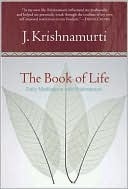More on this book
Community
Kindle Notes & Highlights
“There is only the problem; there is no answer; for in the understanding of the problem lies its dissolution.”
Comparison brings about frustration and merely encourages envy, which is called competition. Like other forms of persuasion, comparison prevents learning and breeds fear.
Wisdom comes when there is the maturity of self-knowing.
you cannot possibly cultivate humility, as you cannot possibly cultivate love, so also virtue cannot be cultivated; and there is great beauty in that. Virtue is nonmechanical, and without virtue there is no foundation for clear thinking.
No authority here or hereafter can give you knowledge of yourself; without self-knowledge there is no liberation from ignorance, from sorrow.
One must know oneself as one is, not as one wishes to be, which is merely an ideal and therefore fictitious, unreal; it is only that which is that can be transformed, not that which you wish to be.
Can the crude mind become sensitive? If I say my mind is crude and I try to become sensitive, the very effort to become sensitive is crudity. Please see this. Don’t be intrigued, but watch it. Whereas, if I recognize that I am crude without wanting to change, without trying to become sensitive, if I begin to understand what crudeness is, observe it in my life from day to day—the greedy way I eat, the roughness with which I treat people, the pride, the arrogance, the coarseness of my habits and thoughts—then that very observation transforms what is.
Separation between God or reality and yourself is brought about by you, by the mind that clings to the known, to certainty, to security. This separation cannot be bridged over; there is no ritual, no discipline, no sacrifice that can carry you across it; there is no savior, no Master, no guru who can lead you to the real or destroy this separation. The division is not between the real and yourself; it is in yourself.
to seek enlightenment when the mind is unenlightened is utterly empty, meaningless. Therefore, I must begin to see the false in my relationships with ideas, with people, with things. When the mind sees that which is false, then that which is true comes into being and then there is ecstasy, there is happiness.
But it is only in freedom that you can find out what is true, what is God, not through any belief, because your very belief projects what you think ought to be God, what you think ought to be true.
This, after all, is the truth: to have the capacity of meeting everything anew, from moment to moment, without the conditioning reaction of the past, so that there is not the cumulative effect which acts as a barrier between oneself and that which is.
We are the things we possess, we are that to which we are attached.
The problem now arises of the observer and the observed. The observer says, “I am empty; I don’t like it,” and runs away from it. The observer says, “I am different from the emptiness.” But the observer is the emptiness; it is not emptiness seen by an observer. The observer is the observed. There is a tremendous revolution in thinking, in feeling, when that takes place.
If we are concerned merely with self-improvement, there is no comprehension of ourselves, of what is.
A mind that is seeking always to be certain is a dead mind, because there is no certainty in life, there is no permanency….
passionate mind is groping, seeking, breaking through, not accepting any tradition; it is not a decided mind, not a mind that has arrived, but it is a young mind that is ever arriving.
All thinking is verbalization; you think in words.
Without freedom from the past there is no freedom at all, because the mind is never new, fresh, innocent. It is only the fresh, innocent mind that is free.
Conflict will always exist as long as the idea is more important than the fact.
Full Heart, Empty Mind
When there is the discovery, the experiencing of that nothingness as you, then fear—which exists only when the thinker is separate from his thoughts and so tries to establish a relationship with them—completely drops away.
fear. Fear is not of the unknown, but of the loss of the known.
The unknown does not incite fear, but dependence on the known does. Fear is always with desire, the desire for the more or for the less. The mind, with its incessant weaving of patterns, is the maker of time; and with time there is fear, hope, and death.
All our education is merely the cultivation of memory; and there is this mass communication through journals, the radio, the television; there are the professors who read lectures and repeat the same thing over and over again until your brain soaks in what they have repeated, and you vomit it up in an examination and get your degree and go on with the process—the job, the routine, the incessant repetition.
If you cannot understand what it is that causes fear and be free of it, then it does not matter very much whether you are living or dead.
So one has to live every day dying—dying because you are then in contact with life.
A man who believes in God can never find God. If you are open to reality, there can be no belief in reality. If you are open to the unknown, there can be no belief in it. After all, belief is a form of self-protection, and only a petty mind can believe in God.
To be aware of this whole process of existence, to observe it, to dispassionately enter into it, and to be free of it, is meditation.


